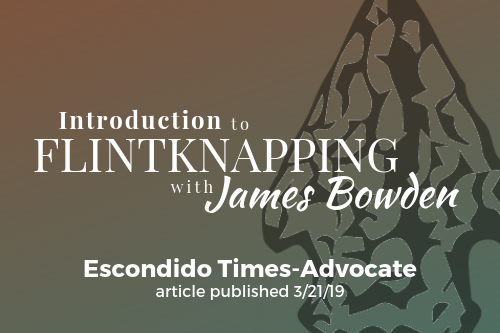
Article on Flintknapping Workshops
The Escondido Times-Advocate published a piece on Thursday, March 21, 2019, about the Center’s upcoming Flintknapping Workshops. Learn more about these two new workshops in the article.
MUSEUM – EDUCATION – RESEARCH

The Escondido Times-Advocate published a piece on Thursday, March 21, 2019, about the Center’s upcoming Flintknapping Workshops. Learn more about these two new workshops in the article.
With the assistance of Center staff, the intern will use photogrammetry to prepare one or more archaeological collections for digital preservation, as well as create a virtual museum exhibit for our Public Archaeology department. Per approval, special projects of the intern’s choosing are also available. During the research and planning, the intern will receive guidance as appropriate to their selected project. Prospective interns should already be familiar with photogrammetric procedures, and Agisoft Metashape.
With the assistance of Center staff, the intern will prepare one or more archaeological collections for curation. During the course of the internship, the intern will learn to identify artifacts and ecofacts common to the San Diego region, including lithics, ceramics, historical objects, and faunal, botanical, and mineral specimens. Center staff will instruct the intern on archaeological laboratory procedures such as basic artifact analysis, manual and computer cataloguing, storage requirements, and preventative conservation. In addition, the intern will become familiar with historical trends in archaeological practice in the San Diego area and will be introduced to current legal and ethical issues in archaeological curation as well as the concerns and rights of culturally affiliated groups with regard to archaeological materials.
Under the direction of Center staff, the intern will support the department in various activities, including, but not limited to, fundraising and grant research; e-newsletter development; social media marketing; and website maintenance. This internship will give the intern valuable, real-world experience in non-profit fundraising and marketing.
Prospective Interns must have completed three courses: Introduction to GIS, GIS Database Management, and Intermediate/Advanced Methods in GIS. The intern will be assigned a project where they will create shapefiles and maps for curated archaeological collections, museum exhibits, and/or public outreach using ArcGIS 10.6. Center staff will instruct the intern on archaeological GIS laboratory procedures such as computer cataloguing, storage requirements, and database management.
With the assistance of Center staff, the intern will arrange and catalog materials in the Center’s library. During the course of the internship, the intern will take a leading role in the cataloging, sorting and storing of research files and creating user guides for these collections. Center staff will instruct the intern on archival procedures, computer cataloging, storage requirements, and preventative conservation.
Harness your passion for Public Archaeology and gain hands-on experience with K-12 museum field trips, lectures, and public outreach. Additional projects may include creating virtual museum exhibits and activities, assisting in the development and implementation of K-12 curricula programs, planning and presenting public facing content, or educational field trip content of your own design. Must be able to pass a Live Scan.